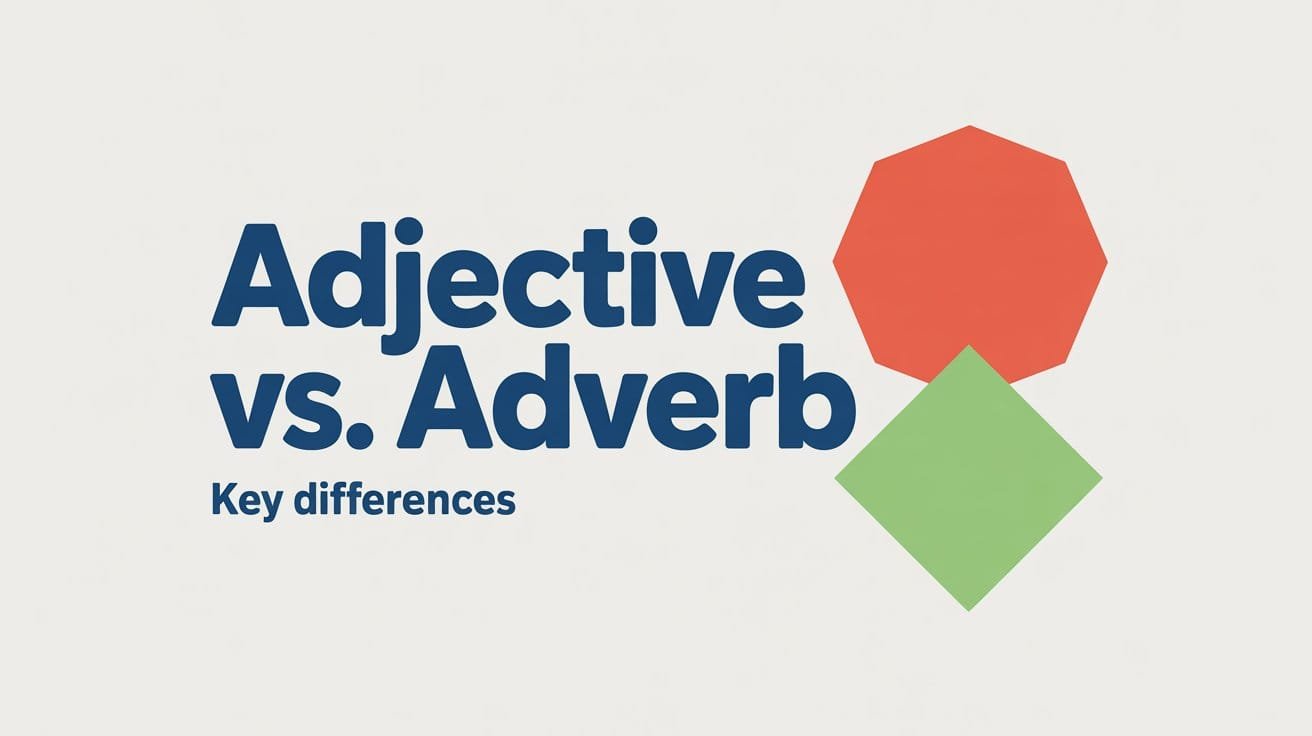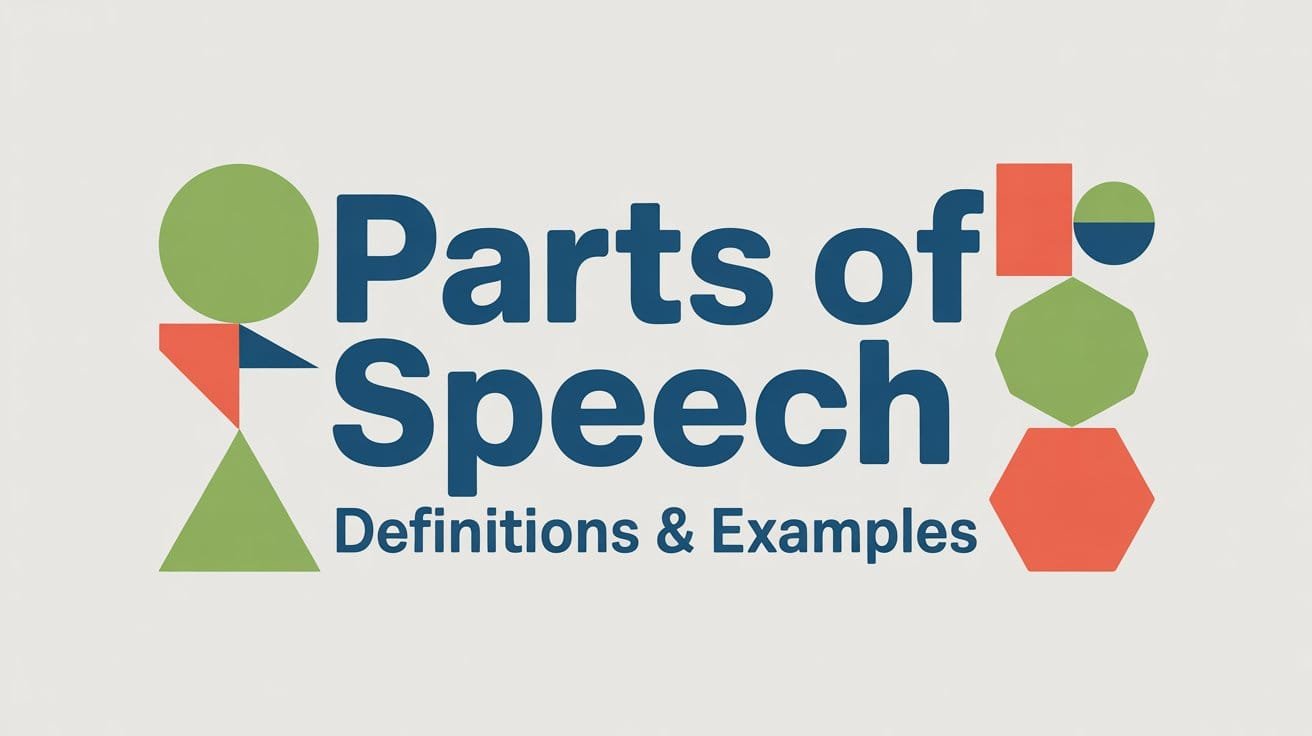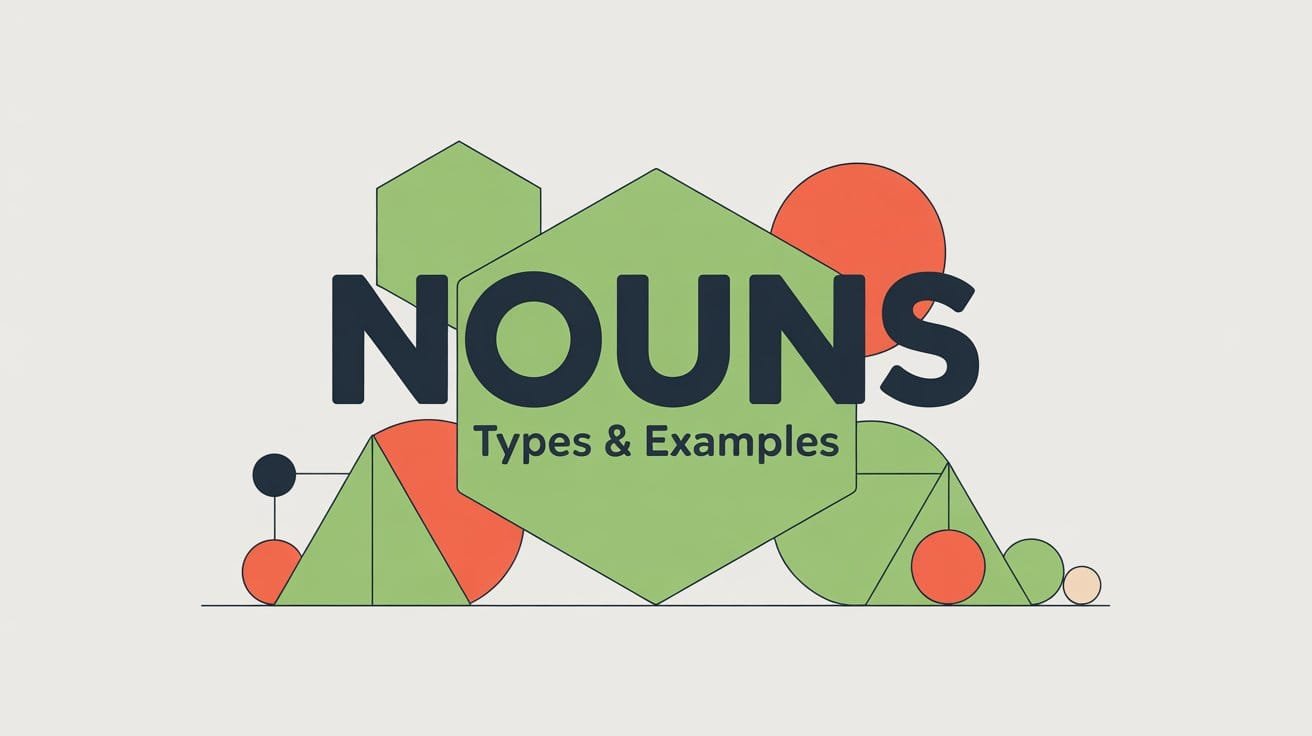Adjectives and adverbs are often confused. Both are parts of speech and play very different roles in a sentence. Adjectives describe or limit nouns, while adverbs give us more information about verbs, adjectives, or even other adverbs.
Learning the difference between an adjective and an adverb can help you write and speak with more accuracy. Whether you’re describing a fast runner or how quickly someone runs, choosing the right word makes your meaning clear.
What Is an Adjective?
An adjective is a word that modifies or describes a noun or pronoun. It gives more detail about what kind, how many, or which one, helping the listener or reader picture things more clearly.
Examples:
- The quiet library was nearly empty.
- She wore a blue dress.
- I have three notebooks in my bag.
Adjectives usually come right before the noun they describe but can also follow linking verbs like be, seem, or feel:
- The soup is hot.
- He feels confident today.
Adjectives answer questions such as:
- What kind? → a broken window
- Which one? → this book
- How many? → five pencils
What Is an Adverb?
An adverb is a word that modifies a verb, an adjective, or another adverb. It tells us how, when, where, or to what extent something happens or is true.
Examples:
- He runs quickly. (modifies the verb runs)
- The room was very quiet. (modifies the adjective quiet)
- She answered quite confidently. (modifies the adverb confidently)
Adverbs answer questions like:
- How? → She spoke softly.
- When? → They arrived yesterday.
- Where? → We looked everywhere.
- To what extent? → He was too tired to continue.
While many adverbs end in -ly, not all do. Words like fast, well, and hard are also commonly used adverbs.
Key Differences Between Adjectives and Adverbs
Although both adjectives and adverbs add detail, they modify different parts of a sentence. Here’s a clear breakdown to help you distinguish them:
| Feature | Adjective | Adverb |
|---|---|---|
| Modifies | Nouns or pronouns | Verbs, adjectives, or other adverbs |
| Answers | What kind? Which one? How many? | How? When? Where? To what extent? |
| Position | Usually before the noun | Often after the verb or adjective |
| Common Endings | No standard ending, varies | Often ends in -ly |
| Examples | a tall building, the red apple | run quickly, very loudly |
Examples Compared:
- Adjective: It was a cold night. (modifies the noun night)
- Adverb: He spoke coldly to her. (modifies the verb spoke)
Adjectives describe what something is.
Adverbs describe how something happens.
Common Mistakes and How to Avoid Them
Using an adjective instead of an adverb
❌ Sophia sang beautiful.
✅ Sophia sang beautifully.
Why: The verb sang should be modified by an adverb (beautifully), not an adjective.
Using an adverb instead of an adjective
❌ He looks happily.
✅ He looks happy.
Why: Looks is a linking verb, so it takes an adjective (happy) to describe the subject.
Confusing adverbs that don’t end in -ly
- He ran fast. → Correct. Fast is an adverb even though it doesn’t end in -ly.
- He ran fastly. → Incorrect. Fastly isn’t a standard English word.
Overusing adverbs when a stronger verb would work
❌ He quickly ran to the store.
✅ He raced to the store.
Tip: Use precise verbs instead of stacking adverbs on weak ones.
Adjective or Adverb? Quick Tips to Decide
If you’re unsure whether a word should be an adjective or an adverb, try these quick checks:
Identify What the Word Is Modifying
- If it modifies a noun or pronoun, it’s an adjective.
- Example: She wore a green scarf.
- If it modifies a verb, adjective, or another adverb, it’s an adverb.
- Example: She walked quietly into the room.
Look at the Sentence Structure
- After linking verbs (like be, seem, look, feel), use an adjective.
- Example: He felt tired after the meeting.
- After action verbs, use an adverb.
- Example: He spoke softly to avoid waking the baby.
Check the Ending
- Many adverbs end in -ly, but not all.
- Examples: carefully, slowly, brightly
- Exceptions: fast, well, hard
Try Replacing the Word
Correct version: He acted foolishly.
Try swapping the word with a known adjective or adverb.
He acted foolish. → Try silly. Sounds wrong?
Adjective vs. Adverb – Examples in Sentences
These example pairs will help you clearly see the difference between adjectives and adverbs in action:
| Adjective Sentence | Adverb Sentence |
|---|---|
| The quiet room made it easy to focus. | She spoke quietly during the meeting. |
| He’s a careful driver. | He drives carefully in bad weather. |
| Her happy face lit up the room. | She smiled happily at the surprise. |
| That was a quick reply. | She replied quickly to the message. |
| It’s a hard decision to make. | He worked hard all day. |
| She gave a polite answer. | She answered politely to the criticism. |
| They had a fast car. | They drove fast through the night. |
| His good behavior impressed the teacher. | He behaved well during class. |
Forming Adverbs from Adjectives
Many adverbs in English are formed by simply adding -ly to an adjective. This transformation allows the word to describe how something is done instead of what something is like.
Regular Pattern: Add -ly
| Adjective | Adverb |
|---|---|
| slow | slowly |
| quick | quickly |
| careful | carefully |
| loud | loudly |
| happy | happily |
These adverbs usually describe how, when, or to what extent an action happens.
- She walked slowly across the room.
- He answered quickly before thinking.
Spelling Changes
Some adjectives require slight spelling adjustments before adding -ly.
- Easy → easily (drop the ‘y’, add ‘i’ + ly)
- Terrible → terribly (replace ‘e’ with ‘y’)
- Gentle → gently (drop the ‘e’)
| Adjective | Adverb |
|---|---|
| angry | angrily |
| happy | happily |
| simple | simply |
| tragic | tragically |
Irregular Forms
Some adverbs do not follow the -ly pattern. Their form is completely different from the adjective, or they stay the same.
| Adjective | Adverb |
|---|---|
| good | well |
| fast | fast |
| hard | hard |
| late | late |
- He plays the guitar well, not “good.”
- The train arrived late, not “lately” (which means recently).
Special Cases and Exceptions
While most adjectives and adverbs follow predictable rules, there are a few tricky forms that often cause confusion. Here’s how to handle them correctly.
Same Form, Different Function
Some words can act as both adjectives and adverbs without changing form. You need to rely on sentence context to tell the difference.
- Fast
- Adjective: She drives a fast car.
- Adverb: She drives fast.
- Late
- Adjective: He caught a late train.
- Adverb: He arrived late.
- Hard
- Adjective: That was a hard decision.
- Adverb: He worked hard all night.
These are not “-ly” adverbs, but they still describe actions.
Good vs. Well
This pair is a classic exception.
- Good is an adjective: She is a good swimmer.
- Well is usually an adverb: She swims well.
However, well can also be used as an adjective when referring to health:
- He looks well after the treatment.
Hard vs. Hardly
These two are not interchangeable.
- Hard means with effort or intensity: She studies hard for exams.
- Hardly means barely or almost not: She hardly studied at all.
Despite the spelling, their meanings are very different.
Late vs. Lately
Like “hard” and “hardly,” these also have separate meanings:
- Late = delayed or after the expected time: The bus arrived late.
- Lately = recently: Have you seen her lately?
FAQs About Adjectives vs. Adverbs
How do I know if a word is an adjective or an adverb?
Check what the word is modifying. If it describes a noun or pronoun, it’s an adjective. If it describes a verb, adjective, or another adverb, it’s an adverb.
Can a word be both an adjective and an adverb?
Yes. Words like fast, hard, and late can serve as both, depending on the sentence. For example, “a fast car” (adjective) vs. “He runs fast” (adverb).
Is “well” an adjective or an adverb?
It’s usually an adverb (e.g., “She speaks well”) but can also be an adjective when referring to health (e.g., “He looks well”).
Why is “hardly” not the same as “hard”?
Though they look similar, “hardly” means “barely” or “almost not,” while “hard” means “with effort.” They are not interchangeable.
Do all adverbs end in -ly?
No. While many do (quickly, happily), some do not, like fast, well, hard, and late.




very good